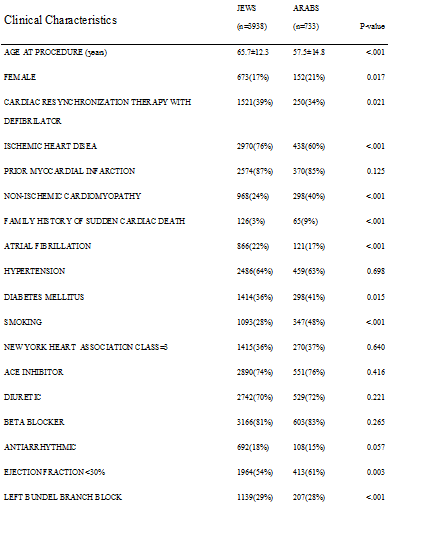Introduction: Heart failure (HF) is an increasingly common condition arising from a variety of different pathophysiological processes. There are major differences in the demographic, etiology and clinical presentations in distinct ethnic groups. Little is known about the unique features of Israeli Arabs who present with heart failure, and who underwent cardiac device implantation.
Methods: The study population comprised 4671 patients who were enrolled in the national Israeli ICD registry. We compared demographic, clinical and echocardiographic characteristics, device-related indications and outcomes between Israeli Arabs (n=733) and Jews (n=3938) who were enrolled in the registry from July 2010 through December 2013.
Results: Israeli Arabs were younger at presentation compared with Jews (57 ±15 years vs. 66 ±12 years, respectively; p<0.001), with a significantly greater proportion of women (21% vs. 17%, respectively; p=0.017), and a higher burden of co-morbidities, including diabetes mellitus and chronic obstructive lung disease and smoking (see table). In addition, Arab patients had a higher frequency of non-ischemic cardiomyopathy (40.2% vs. 24.6%, respectively; p<0.001), which was associated with a greater frequency of familial history of sudden cardiac death. During 15 ±9 month follow-up, the mortality rates and appropriate device therapy were similar in both ethnic groups.
Conclusion: Israeli Arab patients implanted with ICDs display unique clinical features that may reflect a distinct form of non-ischemic cardiomyopathy characterized by an early onset and prompt deterioration.

